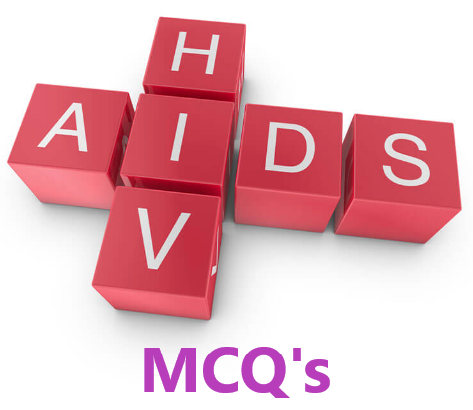HIV & AIDS Multiple Choice Questions
1. What does AIDS stands for?
A. Acute immune deficiency syndrome
B. Human immunodeficiency syndrome
C. Acquired immune deficiency system
D. Acquired immune declined system
Answer: B. Human immunodeficiency syndrome
2. The AIDS epidemic officially began on 5 June 1981 in:
A. Russia
B. UK
C. USA
D. France
Answer: C. USA
3. Who firstly discovered the causative agent of AIDS in 1983?
A. Oxford institute of science
B. Cambridge school of science
C. Pasteur institute in France
D. LIMS
Answer: C. Pasteur institute in France
4. What does HIV stand for?
A. Homie immune virus
B. Homosexual Immunoglobulin virus
C. Human immunodeficiency virus
D. Human immune virus
Answer: C. Human immunodeficiency virus
5. Which of the following cells is infected by the HIV virus?
A. T Killer Cells
B. T Helper Cells
C. Red blood cells
D. Complement cells
Answer: B. T Helper Cells
6. The deficiency of T lymphocytes results in:
A. Stronger the immune system
B. Failure of immune system
C. Increase blood pressure
D. Decrease blood pressure
Answer: B. Failure of immune system
7. Which of the following is the symptom of AIDS?
A. Hepatitis
B. Recurrent Pneumonia
C. Tuberculosis
D. Cholera
Answer: B. Recurrent Pneumonia
8. People living with HIV are more vulnerable to other infections and diseases because:
A. HIV destroys red blood cells
B. HIV destroys hormones
C. HIV destroys CD4+ cells
D. None of these
Answer: C. HIV destroys CD4+ cells
9. Which country has the highest number of HIV patients?
A. USA
B. Mexico
C. South Africa
D. Russia
Answer: C. South Africa
10. Which of the following are the symptoms of AIDS?
A. Rapid weight loss
B. Recurring fever
C. Tiredness
D. All of these
Answer: D. All of these 11. HIV can be transmitted via:
11. HIV can be transmitted via:
A. Sharing needles
B. Vaginal fluids
C. Breast milk
D. All of these
Answer: D. All of these
12. There are how many stages of HIV infection exist?
A. Three
B. Four
C. Ten
D. One
Answer: A. Three
13. At which stage of HIV infection does show symptoms of AIDS?
A. Within 10 days of sexual contact with an infected person
B. When the infected retro virus enters host cells
C. When HIV damages large number of helper T-Lymphocytes
D. When the viral DNA is produced by reverse transcriptase
Answer: C. When HIV damages large number of helper T-Lymphocytes
14. HIV infection in humans is thought to come from a type of:
A. Chimpanzee in Central Africa
B. Mosquitos in Central Africa
C. Bats in Central Africa
D. Chimpanzee in India
Answer: A. Chimpanzee in Central Africa
15. What does SIV stands for?
A. Soft immunodeficiency virus
B. Simian immunoglobulin virus
C. Simian immunodeficiency virus
D. Simian immune virus
Answer: C. Simian immunodeficiency virus
16. What is the CD4 positive T-cells count at which a person infected with HIV has developed AIDS?
A. Below 1,000 per cubic milliliter
B. Below 500 per cubic milliliter
C. Below 200 per cubic milliliter
D. Below 50 per cubic milliliter
Answer: C. Below 200 per cubic milliliter
17. Which of the following individuals are at high risk of getting HIV infection?
A. Individuals with multiple sexual partners
B. Drug addicts who take drugs intravenously
C. Individuals who require repeated blood transfusion
D. All of these
Answer: D. All of these
18. The nucleic acid in HIV is a:
A. ssDNA
B. dsRNA
C. dsDNA
D. ssRNA
Answer: D. ssRNA